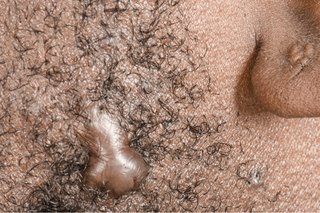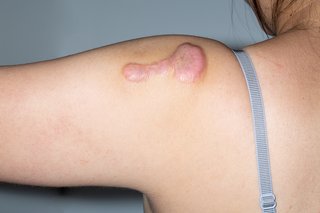Scar Started Hurting Again After Years
When a wound heals, it leaves a scar. A keloid scar is ane that becomes thick, lumpy, raised and larger than the original wound.
What are keloid scars?
A keloid scar is an enlarged, raised scar that tin can exist pink, crimson, skin-coloured or darker than the surrounding skin.
They tin develop later on very minor pare damage, such as an acne spot or a piercing, and spread beyond the original area of skin damage.
What practice keloid scars look similar?


Keloid scars are usually:
- shiny
- hairless
- raised above surrounding skin
- hard and rubbery
- red or imperial at first, before becoming dark-brown or stake
They can final for years, and sometimes practice not grade until months or years after the initial injury.
Do keloid scars hurt?
Keloid scars are usually painless, but some can crusade:
- hurting
- tenderness
- itchiness
- a burning feeling
- limited movement if located on a joint
What causes keloid scars?
Experts do not fully empathize what causes keloid scars, merely they happen when there's overproduction of collagen (the skin'southward protein).
They're not contagious or malignant.
If you take had a keloid scar before, you're more likely to get another.
Who gets keloid scars?
Keloid scars can bear upon anyone, but they're more mutual in people with night skin and information technology's thought they may run in families.
Younger people betwixt the ages of 10 and 30 are more likely to develop them.
Can y'all preclude keloid scars?
You lot cannot completely preclude keloid scars, but yous can avert whatsoever deliberate cuts or breaks in the skin, such as tattoos or piercings, including on the earlobes.
Treating acne will reduce the likelihood of acne scars appearing.
Avoid pocket-sized skin surgery to areas more than decumbent to keloid scarring (the upper chest, back and upper arms) if possible.
Treatments for keloid scars
There are several treatments available, but none have been shown to be more effective than others.
Handling can be hard and is non always successful.
Treatments that may help flatten a keloid scar include:
- steroid injections
- applying steroid-impregnated tape for 12 hours a day
- applying silicone gel sheeting for several months
Other options include:
- freezing early keloid scars with liquid nitrogen to stop them growing
- laser treatment to reduce redness (simply this will not make the scar any smaller)
- surgery, sometimes followed by radiotherapy, to remove the scar (although it can grow back and may be larger than before)
If you're bothered by a keloid scar and want help, see a GP.
Find out more well-nigh how to treat scars
Video: scars - pare camouflage
In this video, an expert explains how skin camouflage is used to cover marks and scars.
Media last reviewed: 23 June 2020
Media review due: 23 June 2023
Page concluding reviewed: 05 June 2019
Next review due: 05 June 2022
Source: https://www.nhs.uk/conditions/keloid-scars/
0 Response to "Scar Started Hurting Again After Years"
Postar um comentário